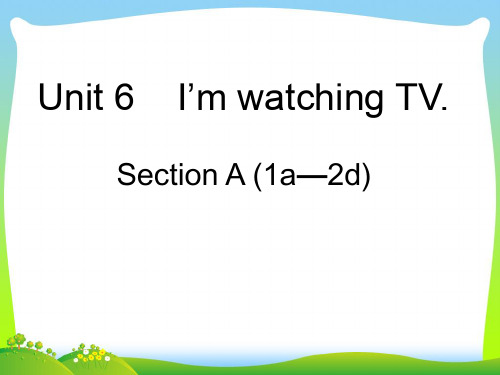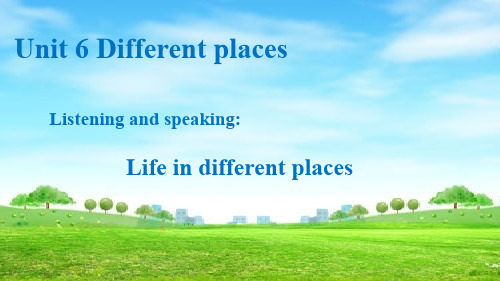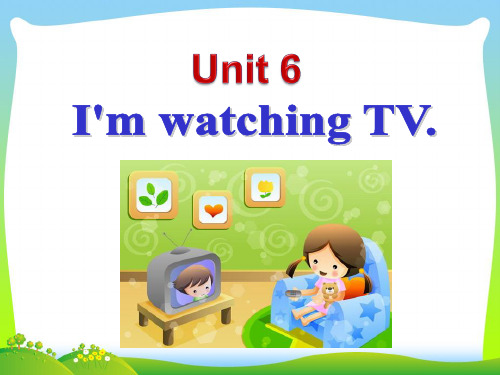七年级_英语_Unit_6___精品PPT课件
新人教版七年级英语下册Unit6 Section A(1a—2d)优质课课件.ppt

▪ (3) 李雷的妈妈正在做汤。 ▪ Li Lei’s mother _____ _____soup. ▪ (4) 杰克正在玩电脑游戏。 ▪ Jack _____ _____ computer games. ▪ (5)三班的学生正在听CD。 ▪ The students of Class 3 _____ _____ to
What is she doing?
She is cleaning .
1a
Match the activities with the pictures.
1. watching TV ____ .
2. cleaning ___.
3. reading a
newspaper .
4. talking on the
_______.Do you want to ________ the movies? Jack: That sounds good.
▪ 2c Role-play the conversation in 2b.
2d Role-play the conversation.
▪ Jenny: Hello? This is Jenny. ▪ Laura: Hi, Jenny. It’s Laura here. ▪ Jenny: Oh, hi, Laura. What are you doing? ▪ Laura: Not much. I’m just washing my clothes. What
▪ (3) —Let’s _____ at the school gate. ▪ —That sounds good. ▪ (4)Where is your pen pal _____? ▪ (5) —What is Jane doing? ▪ —She is _____ TV.
七年级英语上册 Unit 6 Do you like bananas(第5课时)Section B(2a-3b)课件 (新版)人教新目标版

二、根据句意及汉语提示写单词。
6.Dale's brother _w_a_n__ts_(想要) an apple. 7.My son has good eating _h_a_b_i_t_s (习惯). 8.Fruit and vegetables are __h_e_a_lt_h_y_(健康的) food. 9.You can ask me some __q_u_e_s_ti_o_n_s_(问题). 10.The picture is __r_e_a_ll_y__(真正地) nice.
Unit 6 Do you like bananas?
第五课时 Section B(2a~3b)
1.Sports star eats well.体育明星吃得好。 (1)sports star体育明星。 (2)eats是eat的第三人称单数形式。在一般现在时中,当主语是 第三人称单数,就用动词的第三人称单数形式。 (3)well adv.好,主要用于修饰动词。 2.ask sb. about sth.向某人询问某事 3.her eating habits她的饮食习惯 此处eating作定语。eg: I have good eating habits.我有好的饮食习惯。
4.healthy 形容词,意为“健康的”,其名词形式为health,其反义词为 unhealthy。 5.I don't want to be fat.我不想长胖。 want“要,想要”,常用结构有:want sth.“想要某物”;want to do sth.“想做某事”,want sb. to do sth.“想要某人做某事”。 6.What do you like for breakfast?你早餐喜欢什么? (1)for 介词,意为“为了,给”,在句型“have…for breakfast/lunch/dinner”中表示“某人吃什么。” (2)breakfast前面不能用冠词,一日三餐前一般不加冠词。
人教版七年级上Unit6_Do_you_like_bananas)课件

1. Write down the conversation(2c) between your and your partner.
2. Write a report according to the survey.
Unit 6 Do you like bananas
Aims and Language points:
2. -Let’s think about the food.
-Sure.
-让我们想想(吃什么)食物吧。 -当然。/没问题
think about “对…有(某种观点); 回想起;考虑”
Eg. You can think about it. 你可以把这事考虑一下。
Sure.
What do you think about him? 你觉得他这人怎么样?
中用助动词does。 疑问句和否定句中用到does后,谓语动词用原形(like).
Let’s chant
Join us, join us. Let’s have a party. Do you like salad ? Yes, I do. Do you like bread ? No, I don’t. Does he like apples ? Yes, he does. Does she like pears? No, she doesn’t. Do they like hamburgers? Yes, they do. I see. I see. Let’s have a party.
Do you like …?
Names
tomatoes
ice-cream
hamburger s
2a.Listen and circle the food. (Students’ Book Page 32)
人教版七年级下册英语课件Unit 6 I’m watching TV (共54张PPT)

Look! These people are all at home.
What are they doing now?
Look and say.
What is Bob doing now? He is talking on the phone.
Look and say.
What is Tom doing now? He is cleaning.
at home
at school
in a park
cleaning, watching TV, talking on the phone, reading a newspaper
cleaning the blackboard, cleaning the floor, playing soccer, reading
What do they talk about?
Jenny: Hello? This is Jenny.
These people are doing different activities at home now.
People are doing different activities in different places.
1. at home 2. at school
in the classroom in the playground in the library …
What is Lucy doing now? She is exercising.
Look and say.
What is Jenny doing now?
She is watching TV and talking on the phone.
Who is Jenny talking to on the phone?
牛津上海英语七年级上册 Unit6 (共21张PPT)

Unit 6 Different placesListening and speaking:Life in different placesLook, listen and learn!p_ _ceful ea qui_t e pl_ _s_nt ea ar_ l _xing ae /❒✋●✌♦✋☠// ☐●♏⏹♦/令人愉快的/ ☐♓♦♐●/平静的Look, listen and learn!n_ _syoi/✋♦♋✋♦✋☠/exciting c_ _v_n_ _nt / ☜⏹♓⏹✋☜⏹♦/方便的o n e ie/ ⏹✋✋/吵闹的excitingbusyinterestingconvenientnoisyquietrelaxingpleasantpeacefulTown center VS suburbsIn the city centerIn the suburbsS1:Do you like living in the city centre or the suburbs?S2:I like living in ….It’s ….S2:Do you like …or …?S1:I like ….It’s….noisypleasantquietpeacefulinterestingexcitingbusyrelaxingconvenient…Work in pairs!What can you see around your neighbourhood?Look at my neighbourhood!/ ♐♋☺⏹♦☜⏹/ 喷泉f_ _ntain ouThere is a fountain in my neighbourhood.在小区内有一个喷泉。
/ ✋⏹♎☜♈♦⏹/k_ nd_ _g_ _ t_n i er ar eThere isn’t a kindergarten in my neighbourhood.在我小区没有幼儿园。
人教版七年级英语下册unit 6 精品课件

1b Listen. What are these people
doing? Write the numbers from 1a.
a. Jenny __1_ b. John _8__ c. Dave and Mary _5__
What’s she doing? She’s using the computer.
What’s he doing? He’s reading a newspaper.
What’s she doing? She’s exercising.
What’re they doing? They’re washing the dishes.
What’s she doing? ’s cleaning.
15、一年之计,莫如树谷;十年之计,莫如树木;终身之计,莫如树人。2021年7月2021/7/272021/7/272021/7/277/27/2021
16、提出一个问题往往比解决一个更重要。因为解决问题也许仅是一个数学上或实验上的技能而已,而提出新的问题,却需要有创造性的想像力,而且标志着科学的真正进步。2021/7/272021/7/27July 27, 2021
cleaning
reading a newspaper
talking on the phone
listening to a CD
using the computer
making soup
washing the dishes
exercising
9、要学生做的事,教职员躬亲共做; 要学生 学的知 识,教 职员躬 亲共学 ;要学 生守的 规则, 教职员 躬亲共 守。2021/7/272021/7/27Tuesday, July 27, 2021
七年级英语第一学期Unit6词汇课件 PPT课件 译林牛津版
•
46、在浩瀚的宇宙里,每天都只是一瞬,活在今天,忘掉昨天。
•
47、小事成就大事,细节成就完美。
•
48、凡真心尝试助人者,没有不帮到自己的。
•
49、人往往会这样,顺风顺水,人的智力就会下降一些;如果突遇挫折,智力就会应激增长。
•
50、想像力比知识更重要。不是无知,而是对无知的无知,才是知的死亡。
•
51、对于最有能力的领航人风浪总是格外的汹涌。
•
1、再长的路一步一步得走也能走到终点,再近的距离不迈开第一步永远也不会到达。
•
2、从善如登,从恶如崩。
•
3、现在决定未来,知识改变命运。
•
4、当你能梦的时候就不要放弃梦。
•
5、龙吟八洲行壮志,凤舞九天挥鸿图。
•
6、天下大事,必作于细;天下难事,必作于易。
•
7、当你把高尔夫球打不进时,球洞只是陷阱;打进时,它就是成功。
•
32、肯承认错误则错已改了一半。
•
33、快乐不是因为拥有的多而是计较的少。
•
34、好方法事半功倍,好习惯受益终身。
•
35、生命可以不轰轰烈烈,但应掷地有声。
•
36、每临大事,心必静心,静则神明,豁然冰释。
•
37、别人认识你是你的面容和躯体,人们定义你是你的头脑和心灵。
•
38、当一个人真正觉悟的一刻,他放弃追寻外在世界的财富,而开始追寻他内心世界的真正财富。
19、就算生活让你再蛋疼,也要笑着学会忍。
•
20、当你能飞的时候就不要放弃飞。
•
21、所有欺骗中,自欺是最为严重的。
•
22、糊涂一点就会快乐一点。有的人有的事,想得太多会疼,想不通会头疼,想通了会心痛。
七年级上册英语Unit6 单元课件[优质PPT]
apples vegetables carrots pears
runner eat healthy breakfast lunch dinner dessert
跑步明星: 大量的: 健康的食品:
running star lots of healthy food
3a
Questions 1.What’s the running star’s name ? 2.What does she like for breakfast ? 3.What does she like for lunch ? 4.What does she like for dinner ? 5.What does she like for dessert ?
boys keys
tomatoes potatoes
photos radios
milk
uncountable nouns
tea
meat
water
可数名词和不可数名词
不可数名词 (1)定义:是指不能计数的名词。 (2)不可数名词前不可以用 a , an 限定。 (3)不可数名词前不可以用 one, two , three… 限定。 (4)不可数名词没有复数形式。
breakfast? What do you like/have for lunch?
dinner? breakfast, I like/have…. For lunch, I like/have…. dinner, I like/have…
I like hamburgers.
一般疑问句: Do you like hamburgers ? 肯定回答: Yes , I do. 否定句: I don’t like hamburgers . 划线部分提问: What do you like?
新人教版七年级上英语Unit6公开课课件
四、句型转换
Tom has a banana.
变否定句: Tom ________ doesn't ________ have a banana. 变一般疑问句并作否定回答:
_____ Tom _______ Does have a banana?
___ , he _________ No doesn't.
— No. He _______ doesn’t like ______. pears
三、 根据图片提示完成句子。
3. — Let’s _____ have salad.
— Oh, no. I ______ don’t ______ like salad.
三、 根据图片提示完成句子。
4. — Let’s _____ have _________ ice-cream and ___________. hamburgers
Do you like____? Yes, …/ No, …
Sounds good. / Oh, Let’s have ____. no, I don’t like____.
tomatoes
oranges
strawberries
pears
bananas
bread hamburgers
salad
Yong Chuan No. 7 Middle School Xu Faxiang
Revision
volleyball tennis ball
basketball
soccer ball
pong-pong bat baseball bat ping-pong ball — Do you have a basketball? — Yes, I do./ No, I don't. — Does he have a basketball? —Yes, he does./ No, he doesn't.
译林牛津版七年级英语上 unit 6 公开课教学课件
It is good for our health.
be good for 表示“能……有好处(益处)”, 此
短语的反义词是 be bad for (对……有害处)。 e.g.: Running is good for your health. 跑步对你身体有好处。 Watching TV too much is bad for your eyes. 电视看得太多对你的眼睛有害。
Homework
1. Recite Hobo and Eddie’s dialogue, act it out with your partner.
2. Copy the phrases twice each. 3. Prepare for the next lesson.
ing 形式,相当于 do well in .
e.g.: Mike is good at swimming. 迈克擅长于游泳。 I am good at English. 我擅长英语。 My father does well in drawing horses. 我父亲擅长于画马。
Exercises
1. I didn’t eat breakfast this morning, I am h_u_n_g_r_y___ now.
2. He eats a bo_w__l__ of rice every meal. 3. He’s a football player. He needs lots of
Listen to the comic strip again and do the true or false questions.
- 1、下载文档前请自行甄别文档内容的完整性,平台不提供额外的编辑、内容补充、找答案等附加服务。
- 2、"仅部分预览"的文档,不可在线预览部分如存在完整性等问题,可反馈申请退款(可完整预览的文档不适用该条件!)。
- 3、如文档侵犯您的权益,请联系客服反馈,我们会尽快为您处理(人工客服工作时间:9:00-18:30)。
I like bananas.
Do you like salad?
No, I don’t.
I don’t like salad.
Does he like pears?
Yes, he does.
He likes pears.
Does she like oranges?
No, she doesn’t.
She doesn’t like oranges.
Do they like ice cream?
Yes, they do.
They like ice cream.
Listening for section A 1b
2
3
Listening for section A 2a
Ice cream
broccoli
Pairwork
Jenny
like don’t like/doesn’t like
Tom
Conclusion &homework
Do you like salad?
Do they like French fries? Does he like pears?
Yes, I do.
Yes, they do. Yes, he does.
Food survey: what food do your friends like or don’t like ?
结束语
当你尽了自己的最大努力时,失败也是伟大的, 所以不要放弃,坚持就是正确的。
When You Do Your Best, Failure Is Great, So Don'T Give Up, Stick To The End
感谢聆听
不足之处请大家批评指导
Please Criticize And Guide The Shortcomings
演讲人:XXXXXX 时 间:XX年XX月XX日
No, I don’t.
No, they don’t. No, he doesn’t.
I like orange. They like salad. She likes bananas.
I don’t like bananas. They don’t like broccoli. She doesn’t like ice cream.
Listening for section A 2b
broccoli
broccoli
ice cream
ice cream
General questions for usage of “do”& “does”
you
Do
they
ice cream?
oranges ?
apples? like
he
strawberries?
Unit 6 Do you like bananas?
授课教师:
a tomato
tomatoes
broccoli
French fries
an apple
three apples
an orange
oranges
ice cream
salad
bananas
strawberries
a pear
pears
a tomato
broccoli
French fries oranges
ice cream
sa
a pear
three apples
carrots
an egg
chicken
g a
h
e f
c b
i d
Do you like bananas?
Yes, I do.
Does
she a name
salad?
Yes, I/they do. Yes, he/she does.
No, I /they don’t. No, he/she doesn’t.
Sentence structures
Do you like salad?
Yes, I do.
Do they like French fries? Does he like pears?
Yes, they do. Yes, he does.
No, I don’t.
No, they don’t. No, he doesn’t.
I like orange. They like salad. She likes bananas.
I don’t like bananas. They don’t like broccoli. She doesn’t like ice cream.
